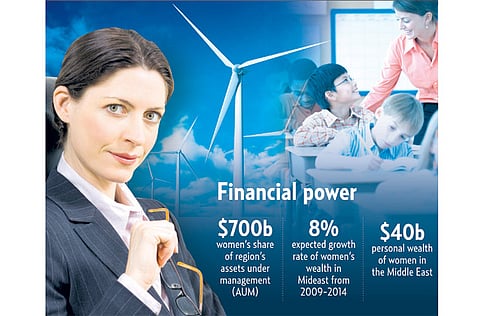Women investors target corporate responsibility
Focus more on social profit than just financial gains

Dubai: Wealthy women in the Middle East are increasingly choosing to pour their money into social investments, according to financial advisers.
They controlled 22 per cent, or around $700 billion (Dh2.57 trillion) of the region's assets under management (AUM) last year, according to a study by Boston Consultancy Group (BCG). Popular among women investors are sustainable development projects in the environment, construction and retailing, said Shimi Shah, former chief executive of Forsa and Chairman of Carousel Solutions.
"It's a business approach to a social problem and that's more effective than a charity or handouts where there is no measure of progress," said Heather Henyon, Managing Partner of Balthazar Capital, a microfinance investment advisory.
"Women are more interested in it than men because they are not as focused only on financial profit but also social profit." Shah said there is a new type of woman investor now and they are focused on making a difference in the world.
"You're seeing women being much more confident about their wealth. They are not flaunting it, but it's not just about buying designer bags and watches.
"They want to do good, they are a lot more savvy about the region, and they're talking about corporate social responsibility — that's a very powerful message coming out now," said Shah. Social investments are not charities and the return is about five per cent, said Henyon.
For these women investors it was not about making the maximum profit or investing in the biggest project, she added.
Rather, they are interesting in social investment because of its activist role which allows them to make money and do good, Henyon said.
The wealth that women in the Middle East control is expected to grow eight per cent from 2009 through 2014. They also have an estimated $40 billion (Dh146.9 billion) in personal wealth.
Despite women's potential as wealth management clients, there is a lack of adequate financial advisers to meet their needs in the region. Many financial advisers either overlooked women or used superficial strategies to reach them, a BCG report said.
"Many cannot find advisers who take them seriously, let alone advisers they can trust. Clients who lack a solid understanding of investments [but want to learn] said that relationship managers do not adequately explain the products and their risks," said Dr Sven-Olaf Vathje of BCG Middle East.
What do you think has caused this shift towards social investments? Why do you think women make good investors? How will this increase in investments affect the region?



